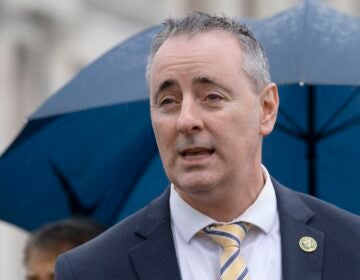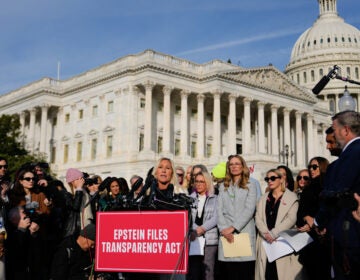President Trump’s ‘big, beautiful bill’ is now law. How will it help and hurt New Jersey residents?
The bill, signed by President Trump on July 4, will offer tax breaks for some in New Jersey, but lower-income residents will lose crucial benefits.

President Donald Trump walks on the South Lawn upon arriving at the White House, Saturday, June 21, 2025, in Washington. (AP Photo/Jose Luis Magana)
From Camden and Cherry Hill to Trenton and the Jersey Shore, what about life in New Jersey do you want WHYY News to cover? Let us know.
On the Fourth of July, President Donald Trump signed his “big, beautiful bill” into law. The legislation includes numerous spending cuts and tax breaks for taxpayers.
What’s the impact on New Jersey?
About one in five New Jersey residents receive Medicaid assistance. The state is expected to lose about $3.6 billion in Medicaid funding annually. According to New Jersey Department of Human Services Commissioner Sarah Adelman, this will result in:
- About 350,000 low-income, elderly and disabled residents losing health care coverage
- $3.3 billion in annual cuts in funding to hospitals and public health funding
- $360 million annual cuts to the state budget due to reductions in federal funding and provider assessments
Adelman said the law will:
- Restrict the definition of qualified immigrants starting in October 2026
- Impose work requirements for able-bodied New Jersey adults as soon as January 2027, and no later than January 2029
Individuals with slightly higher salaries, who were allowed to join Medicaid following the enactment of the Affordable Care Act, will be responsible for a $35 copay for treatment, starting in fall 2028.
SNAP funding will be cut
Adelman said that 800,000 residents receive assistance through the Supplemental Nutrition Assistance Program, or SNAP, and starting in October 2028, the state will be required to provide an additional $100 million to $300 million because of a new cost-sharing requirement for states, or risk eliminating the entire SNAP program for New Jersey. County governments will need to find an additional $78 million annually because of decreasing federal reimbursements.
The new law also requires more New Jersey residents who receive SNAP benefits to work in order to continue to be enrolled in the program. The bill additionally calls for a reduction in the reimbursement rate paid to hospitals, physicians and other providers who serve Medicaid patients.
Who are the beneficiaries?
The legislation signed into law July 4 increases several tax breaks:
- The standard deduction will rise from $15,000 to $15,750 for singles and $30,000 to $31,500 for people who are married and filing jointly in 2025
- The child tax credit will rise from $2,000 to $2,200 per child and $1,700 is refundable in 2025
- The estate and gift tax exemption rises from $13.99 million to $15 million for single individuals and $27.98 million to $30 million for married couples filing jointly in 2026
- The state and local tax deduction, also known as SALT, limit will go up from $10,000 to $40,000 in 2025, with 1% increases through 2029. It could then revert to $10,000 in 2030
The new law has a “no tax on tips” provision that creates a new deduction up to $25,000 for tipped workers, eliminating what they owe in federal income tax, but tipped workers would still have to pay state and local income tax and payroll taxes.
It also allows workers to deduct up to $12,500 for overtime pay earned. However, the changes are only in effect until the end of 2028.
There will be a $6,000 tax deduction for individuals aged 65 or older with income up to $75,000 — or up to $150,000 for married couples. This deduction is also temporary and set to expire after 2028 unless extended by lawmakers.
According to the nonpartisan Congressional Budget Office, the law is projected to increase the national debt by $3.3 trillion over the next 10 years. The White House states the new law delivers the largest middle- and working-class tax cut in U.S. history.

Get daily updates from WHYY News!
WHYY is your source for fact-based, in-depth journalism and information. As a nonprofit organization, we rely on financial support from readers like you. Please give today.







